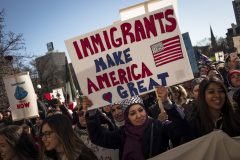
by Olivia HAMPTON
Agence France Presse
WASHINGTON, United States (AFP) — The Trump administration appears to have dropped plans for an immediate appeal to defend the president’s travel ban before the Supreme Court.
A Justice Department filing Monday indicated that it would continue to defend President Donald Trump’s executive order in a federal appeals court that refused to reinstate it last week.
The appellate court decision was handed down by a three-judge panel, after a federal judge froze the ban.
The brief, signed by Justice Department attorney Michelle Bennett, did not mention any possible appeal before the Supreme Court, suggesting that the Trump administration may have concluded it would have poor chances of success after two successive court defeats.
The highest court in the land has been shorthanded, and deadlocked in a 4-4 split between liberals and conservatives for a year.
Trump has nominated a Neil Gorsuch to fill the seat left vacant after the death of conservative stalwart Antonin Scalia, but no Senate vote has yet been set for his confirmation.
US District Judge James Robart issued a temporary restraining order on February 3 blocking key provisions of Trump’s travel restrictions, a decision upheld Thursday by the Ninth Circuit Court of Appeals in San Francisco.
The order temporarily barred people from seven Muslim-majority countries from traveling to the United States for 90 days, as well as all refugees for 120 days — except those from Syria, who were banned indefinitely.
Bennett asked Robart to “postpone any further proceedings” in his district court pending a decision by the appeals court on whether to rehear the case.
But Robart, ruling from the bench, denied the request for a delay.
“I’m not prepared to slow this down,” Robart said, according to CNN.
So the challenge to the ban — filed by the states of Washington and Minnesota — will go before the judge.
The states had urged the judge to expedite the process for the parties to exchange information, citing “the gravity of the states’ constitutional allegations, defendants’ stated national security concerns and the public interests at stake.”
In the appellate court, an unidentified judge has requested that both parties submit briefs by Thursday on whether the three-judge panel’s ruling should be reconsidered by a larger set of judges.
The Ninth Circuit Court of Appeals’ “en banc” panels typically consist of 11 judges.
Few options for Trump
The Trump administration asked that Robart take no action over the lawsuit brought by the states of Washington and Minnesota while the San Francisco court decides whether a larger set of judges will reconsider Thursday’s decision a panel of three judges who turned down the government’s request to reinstate the president’s travel ban.
Trump, who took the unusual step of publicly denouncing the appellate court’s decision as “political,” vowed last week to take the fight all the way to the Supreme Court, claiming in an all-caps tweet that “THE SECURITY OF OUR NATION IS AT STAKE!”
And his administration had hinted it may unveil new measures on immigration in the wake of its court defeats.
But the young presidential administration may have decided to change the course faced with a dearth of options.
Pursuing a legal battle in Robart’s court is risky, in light of the judge’s intent to block the entire order, while the rather progressive appeals court in San Francisco rebuffed the administration’s arguments.
And a Supreme Court tie would keep the appellate court ruling intact.
© Agence France-Presse








